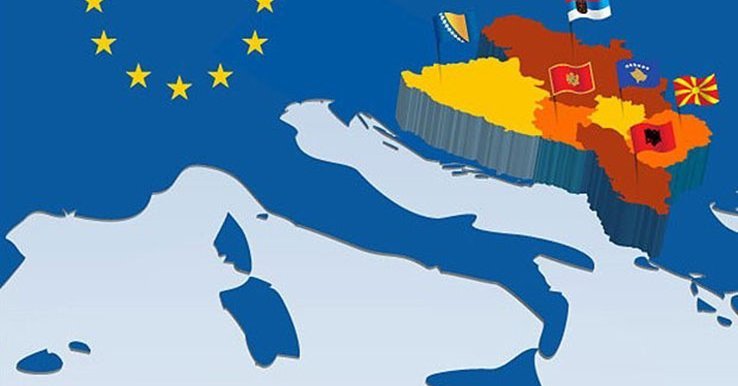Around this time last year, the European Union released its Strategy for the Western Balkans, where the “credible enlargement perspective” for the six remaining “Western Balkan” countries was reiterated. Some saw the strategy as a “way forward”, others as a “bucket of cold water” for the region, but no one cringed at the term “Western Balkans” itself. Today, this sixteen-year-old neologism coined at the 2003 EU-Western Balkans Summit in Thessaloniki is used so casually by foreigners and locals alike that it has long lost its quotation marks.
Given my long-standing advocacy in my native country North Macedonia for compromise on the name dispute with Greece, I am hardly one to make a fuss over terminology. But this is bigger than words. The 2018 adoption of the name ‘North Macedonia’ was part of a broader deal called the Prespa Agreement, which contained explicit protections of the distinctiveness of the Macedonian language and nationality. Therefore, it carried no negative identitarian implications; what it did carry was major positive implications of accelerating the country’s European integration. The perpetuation of the construct “Western Balkans”, however, has had the exact opposite (and immediate) political effect: it has transformed a set of countries with their own (sometimes distinct) challenges into an artificially homogenous and politically charged mental box.
In the past decade and a half, the Western Balkan label has had four unfortunate effects. It has perpetuated the ever-present stereotype of Balkan backwardness; restored the old stereotype of “Balkan-ness” as “Western-ness” in waiting; pitted (Western) Balkan nations against each other; and, most importantly, delayed the region’s European integration that it was allegedly created to accelerate.
The Balkans: everybody’s worst nightmare
A German essayist once wrote that “if the Balkans hadn’t existed, they would have been invented.” Insofar as virtually none of the presumed “Balkan” people identify as “Balkan”, the Balkans really are – and always have been – invented.
In her otherwise illuminating account of Western stereotypes about the Balkans as a “brutal and uncivilized forecourt of Europe”, Maria Todorova articulates her lifelong struggle to learn how to “love the Balkans without being proud or ashamed of them”. Todorova does a masterful job of proving that what one usually thinks of as “Balkan” is more often than not rooted in outside fantasies than in cultural reality. Yet, by summarizing these fantasies as “Balkanism,” and by counterposing them as a fake -ism against the “real” Balkans, Todorova implies that there is an actual “Balkan-ness” somewhere out there that is merely being distorted by stereotype.
This implication stands at odds with Todorova’s own shrewd observation that all populations inhabiting the Balkan Peninsula have internalised “Balkanism” by accepting – and even expanding on – some of the negative outside stereotypes about their own cultures. Milica Bakić-Hayden has demonstrated that this internalization, rather than serving as a helpful mechanism for people to reflect critically on their way of life (to make sure that there is no truth behind the stereotypes!), actually operates as an unquestioning admission of “Balkan” backwardness and, subsequently, as an endless struggle to portray oneself as being as non-Balkan as possible.
Thus, if “Balkan” is nothing more than a toxic label for “Balkan” nations to disown with indignation, then there are surely no “Balkans” to be proud or ashamed of in the first place: any use of the word “Balkan” is meaningless at best and inextricable from negative stereotype at worst.
The best example of the inextricably negative connotation of the word “Balkan” lies in its use with regards to the Yugoslav wars in the 1990s. While these wars did (partly) occur on the territory of the Balkan Peninsula, there is a clear practical reason not to call them “Balkan” in order to avoid confusion with the Balkan wars of the early 20th century. Unlike the earlier wars of the pre-WWI era, which also engulfed non-Yugoslav “Balkan” countries such as Bulgaria, Romania and Albania, the Yugoslav wars in the 1990s were a direct product of the collapse of the Yugoslav state, and can thus only be called “Yugoslav”.
The limited use of the term “Balkan” during the Yugoslav era indicates that it only took the West a couple of years to mentally relocate – and relegate – the people living in this space from being “Yugoslav” to being “Balkan”. To fit the barbaric profile of war fanatics, the descendants of Tito’s formidable state had to be renamed into “Balkan” overnight.

To this date, leading Western media corporations such as BBC and CNN refer to the Yugoslav conflicts as “Balkan wars”. The Balkan label is out there for people to borrow every time they want to denigrate someone, even by attaching it to contexts in which it was never used before. “Balkan” has long surpassed the Balkan Peninsula and taken a life of its own: even Germans can sometimes be heard dismissing their Austrian neighbours as – you guessed it – “Balkan”.
And if this still does not prove the inherently negative connotation of the Balkan label, one need only remember that the word “balkanization” is a regular English word (a synonym for “fragmentation”) available for use in completely non-Balkan contexts. When Pope Francis used this term after the Brexit referendum to warn against the “balkanization” of the EU itself, the irony could hardly be greater.
(Western) Balkan = Western in waiting
Clearly, no one wants to be Balkan. But what about “Western Balkan”? Has the EU cleansed the old Balkan label of its inherently negative connotation? For one, “Western Balkan” certainly proposes a different type of “Balkan-ness” than the one portrayed in the early 1990s, when the Balkan label reached its all-time low (in its always negative history) with the wars in the former Yugoslavia. If the Balkans were then seen as “incapable of change”, doomed to their “time-capsule world: a dim stage upon which people raged, spilled blood, experienced visions and ecstasies”, the Western Balkans are defined today exactly by their prospect of change (through European integration).
One might even be tempted to view the abrupt merger of the hitherto antipodes “Western” and “Balkan” as the well-meaning creation of a suit for countries to grow into – a demonstration of the EU’s faith in its candidate members to reconcile their actual Balkan-ness with their wannabe Western-ness.
Yet, Todorova would in all likelihood not only be cautious to welcome “Western Balkans” as a positive shift in perception, but refuse to see it as a shift at all. In fact, what makes Todorova’s seminal work distinctive from Edward Said’s “Orientalism” is exactly the notion that the Balkans (unlike the Orient, which is seen as “[an] antiworld to the West separated from it with an unbridgeable chasm”) are seen as “a semi-developed and semi-civilized bridge between stages of growth.”
This makes the Balkans less of an “other” than an “incomplete self”, a notion perfectly replicated in the fluid category of the “Western Balkans”, whose membership is defined by the EU accession process and ends the second after EU accession is completed. Thus, the “Western Balkan” variant is, in fact, merely a modern articulation of the old Balkan stereotype: a faceless entity whose only goal is to catch up with the West as a mark of civilization.
The notion of EU integration as a mark of civilization was once echoed almost word for word in a 2018 statement by EU High Commissioner Federica Mogherini.

“The European Union integration path [is] a little bit [like] a video game. Every time you manage to get scores on one level, you get to the following level and you have new tasks. The important thing is not to get to the “game-over”, but to achieve extra points and get to the highest level“.
Thus, the Balkans are a virtual entity that only exists in the “video game” of EU integration. Clearly, the only effect of the addition “Western” – rather than cleansing the Balkan label of its toxic connotation – has been the formal actualization of the old image of the Balkans as a transient limbo. This presumed transience has in turn set off a dog-eat-dog race between the Western Balkan countries with one goal: to outgrow one’s own Balkan-ness faster than everyone else.
“No, you are more Balkan!”
“No one wants to be part of the Balkans – for Croatians, the Balkans begin in Bosnia; in Bosnia, the Balkans begin in Serbia; and in Serbia, they begin in Romania”. This painfully accurate statement on the reproduction of the Balkan stereotype by the “Balkan” nations has not been made by a scholar, but rather by a 14-year-old boy from Zagreb. The EU’s actual intentions behind coining the “Western Balkans” are irrelevant. Concepts have to be coined with care for their intertextuality, or the set of existing meanings that the new concept can reasonably be expected to evoke. As the Balkan label has only ever been rejected and passed onto one’s neighbor with indignation, the EU could hardly expect these countries to embrace the “Western Balkans” as a collective opportunity for “westernizing” (progress), rather than for the progress of some over the further “balkanizing” (regression) of others.
With the fixed duration of its membership, the “Western Balkan” category poses an obvious problem to regional cooperation. In 2011, after joining the EU (and leaving the “Western Balkans”), Croatia was abruptly excluded from official criticism for insufficient post-war reconciliation, and even regional youth seminars for reconciliation decided that Croatian students no longer needed to learn how to reconcile. With this in mind, the only thing that was surprising about the dismissal of the recent verdict against Bosnian Croat war criminals as “moral injustice” by the (avowedly moderate) Croatian Prime Minister Andrej Plenković was that it was received as a surprise. EU membership is hardly a magic wand that can swipe out denial in post-war societies. Croatia may have officially “left” the (Western) Balkans, but did the “Balkans” leave Croatia? And what exactly does a university degree in Western Balkan Studies look like? Are students downgraded for writing essays on post-war reconciliation in Croatia after its presumed departure from the (Western) Balkans in 2011?

Finally, it appears that Todorova’s worst nightmare has come true: “(Western) Balkan” nations are not only reproducing “Balkanism” by projecting it onto others, but also by internalizing it. “Stabilitocracy“ is a term commonly used by scholars to describe the proliferation of authoritarian regimes in the “Western Balkans” that have been tolerated by the EU for the sake of stability. What has not been considered is that the EU might have facilitated stabilitocracy with its terminology even more than it has facilitated it with its (in)actions. The expectation of constant, rapid, and always insufficient self-improvement that is inherent to the (Western) Balkan label has created a “Western Balkan” public that is strongly convinced of having exactly the kind of government they “deserve”.
For instance, the only explanation for how the popularity of Serbian president Aleksandar Vučić has grown despite – or because of – what would otherwise be politically suicidal statements, such as that “the reason Serbia is falling behind so much is because Serbs are complainers”, is that Serbs must have lost their last shred of self-worth. It is surely the biggest dream of every dictator to be in a position of such limitless impunity, where they can conveniently blame their own failures on the alleged laziness of the very people who vote for them.

After all, the EU has also been implicitly acknowledging the expectation of a subservient mindset among the “Western Balkan” countries. Its constant talk of the “resilience” of the region has been interpreted by scholars as somewhat of a Freudian slip. The apparent compliment of the resilience of these countries is, in fact, an ominous revelation that the EU integration of the Western Balkans comes down to “Western Balkan” countries staying patient about the enlargement fatigue in Brussels, rather than to the actual progress of their reform processes.
Stuck in the waiting room
If blaming the Western Balkan label for the inferiority complex observed in Serbia might feel like a stretch, the correlation between the perpetuation of this label and the excruciatingly slow pace of the European integration of the region has been obvious. It was actually long before 2003 that the EU first sought to (understandably) delineate the war-torn region from the rest of the ex-Communist Bloc: the 1999 Stability Pact for Southeastern Europe included each of the eight nations (minus the then still not independent Montenegro and Kosovo) that would become “Western Balkan” only four years later.
Thus, it is tempting to wonder why the term “Southeastern Europe” was deemed less sustainable than “Western Balkans”. The eight countries in question are indeed all located in Southeastern Europe, and the somewhat earlier EU accession of Bulgaria and Romania would not have invalidated this category any more than Croatia’s accession in 2011 invalidated the Western Balkan one. If anything, “Southeastern Europe” would have served as a conveniently neutral geographical designation free of the massive stereotypical burden of the Balkan label.
Yet, between 1999 and 2019, “Southeastern Europe” got unmistakably lost in the bureaucratic Brussels corridors. The Big Bang enlargement into ten (mostly ex-Communist) countries in 2004 is often credited as the godfather of some of today’s well-established Eurosceptic parties in Western Europe. It might also have been the tacit godfather of the Western Balkan label. The two non-“Western Balkan” East European countries that had been left out of the 2004 enlargement, Romania and Bulgaria, could not be allowed to remain in one unnamed category with the five soon-to-become “Western Balkan” countries, as this would have implied that none of these seven countries were fundamentally distinct from the countries that had joined in 2004.
This would have then implied that the Big Bang enlargement would soon have to be completed with the admission of just as many ex-Communist countries as in 2004, only less developed, more volatile, and with growing emigration. Thus, with the stroke of a pen, the creation of the Western Balkan label postponed the admission of these countries indefinitely by depriving them of their “(South)east European-ness”, and by restoring them to their all-too-familiar “Balkan-ness”.
In 2019, what has remained of the Western Balkans is still a long way from EU membership. Yet, what one can find among the “Western Balkan” populations is a gradual but unmistakable dip in the appeal of the EU, with just over half of their people now viewing EU membership as a “good thing”. The Western Balkan label has blatantly proven to be a “lose-lose” idea. Sixteen years since its coinage, it has visibly failed to stave off Eurosceptisim within the EU. And in the “Western Balkans”, years of cosmetic reform have indeed made the “Western” and the “Balkan” increasingly irreconcilable. The limbo condition of these countries that has been so firmly perpetuated by the Western Balkan label may well have become a sad, self-fulfilling prophecy.


0 comments